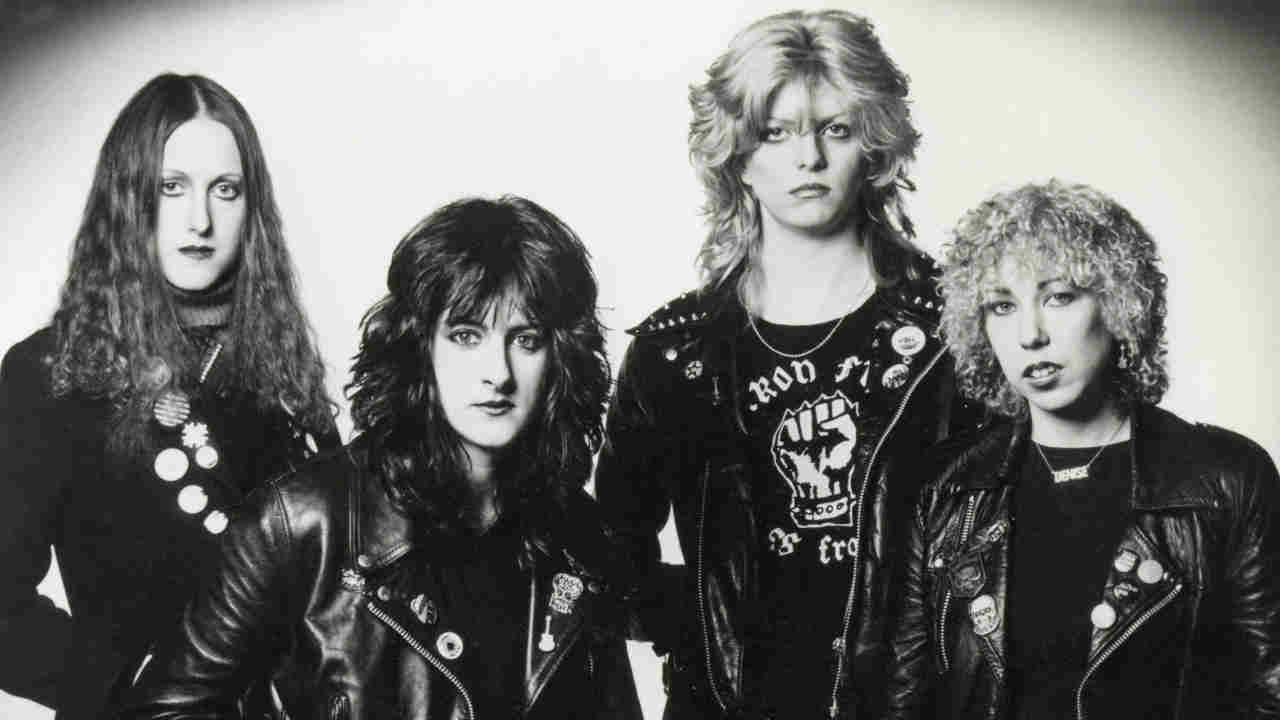Muddy Waters: Life After Chess
Cut loose from Chess Records, Muddy Waters teamed up with Johnny Winter for Hard Again, the first in a trio of albums that served as the Hoochie Coochie Man’s brilliant final flourish.
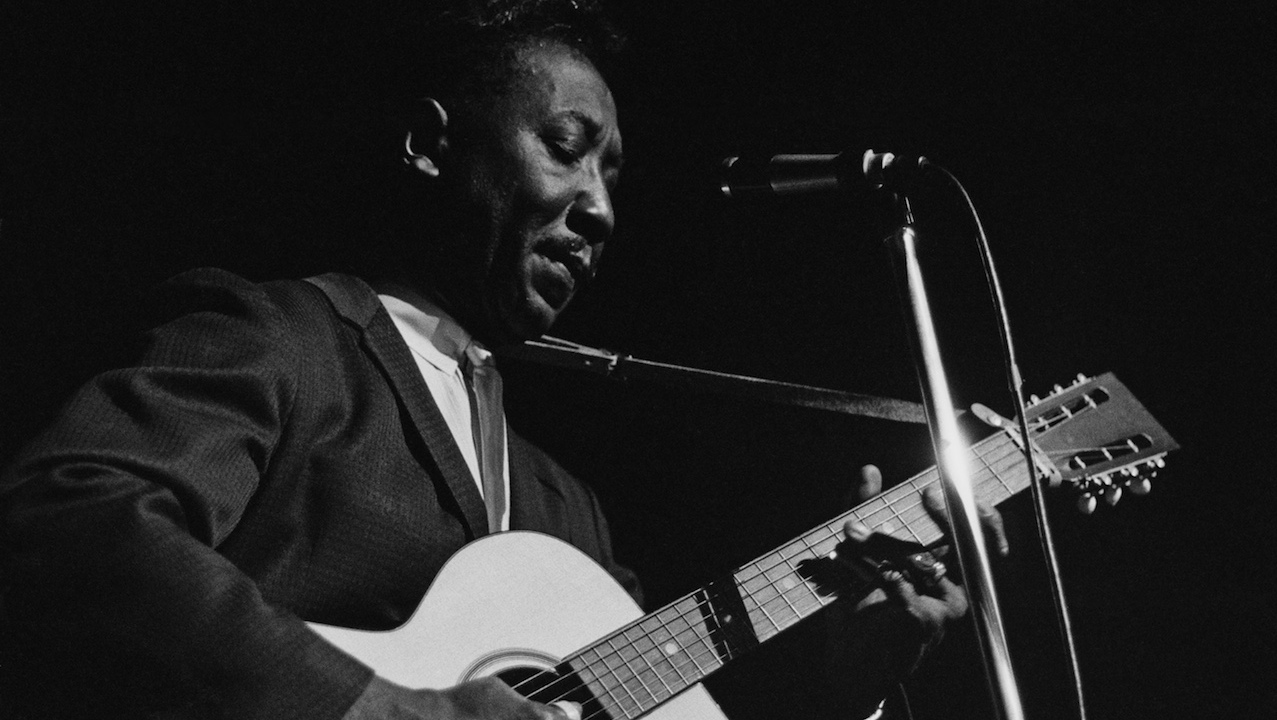
This article first appeared in The Blues #8, August 2013.
Muddy Waters always swore that he would never leave Chess Records, the Chicago label virtually founded on the success of his 1948 smash hit I Can’t Be Satisfied, so long as a member of the Chess family was still running the company. As it happened, he hung in there until five years after the last member of the dynasty was gone. His departure, after almost three decades, was the equivalent, in terms of the blues landscape, of the Empire State Building deciding that it had finally had enough of Manhattan and relocating to LA.
Willie Dixon, who’d written so many classic songs for Muddy and added his arranging smarts and powerful bass to so many of his greatest sessions, was long gone. Company patriarch Leonard Chess had sold the label to the GRT corporation in 1969, and died a few months later. GRT shifted Chess HQ from Chicago to New York and opted to install Leonard’s son Marshall Chess as president, rather than his Uncle Phil.
After less than a year, Marshall abandoned the family firm to run The Rolling Stones’ newly formed label, leaving Muddy and Howlin’ Wolf pretty much isolated. In 1975, the company was sold yet again but not until, to add insult to injury, the historic Chess studio had been closed down.
“That be the second time they sold me, and I got tired of being sold to everybody,” Muddy recalled later. “I said, ‘This ain’t no good for me. I quit.’”
So Muddy and his manager went label-shopping. In talks with CBS’s Epic division, they were recommended to check out the corporation’s subsidiary Blue Sky, run by Steve Paul, who managed Johnny Winter. “When they said ‘Johnny Winter’, this was it. I was just thrilled all over, because when I met Johnny a few years ago in Texas, he didn’t have the big contract and he wasn’t a big rock’n’roll star. He was playin’ so much of the old stuff. I figured this was the greatest chance, man, of all my days, to get with someone who’s still got it, got that early 50s sound.
“We tried to keep it down in the 50s style, and I think this is one of the best records I’ve made in a long time, with that real ‘Muddy Waters’ sound. I think this is the top. I really do.”
Sign up below to get the latest from Classic Rock, plus exclusive special offers, direct to your inbox!
Well, that’s the way Muddy told it to me, over small buckets of vintage champagne one spring afternoon way back in 1977, in his small but comfortable living room just outside Chicago. The new record he was bigging up so proudly, the first fruits of his liaison with Johnny Winter, was called Hard Again (in honour of Muddy’s pee-pee), and it was a game-changer of epic proportions.
For Muddy, Hard Again revitalised not only his flagging career, but also his belief in and enjoyment of his own music. For Johnny Winter, it was not only the culmination of a lifetime ambition, but the trigger for a full-on artistic rebirth, reconnecting him with his fundamental instincts as a bluesman after several management-driven arena-rock years.
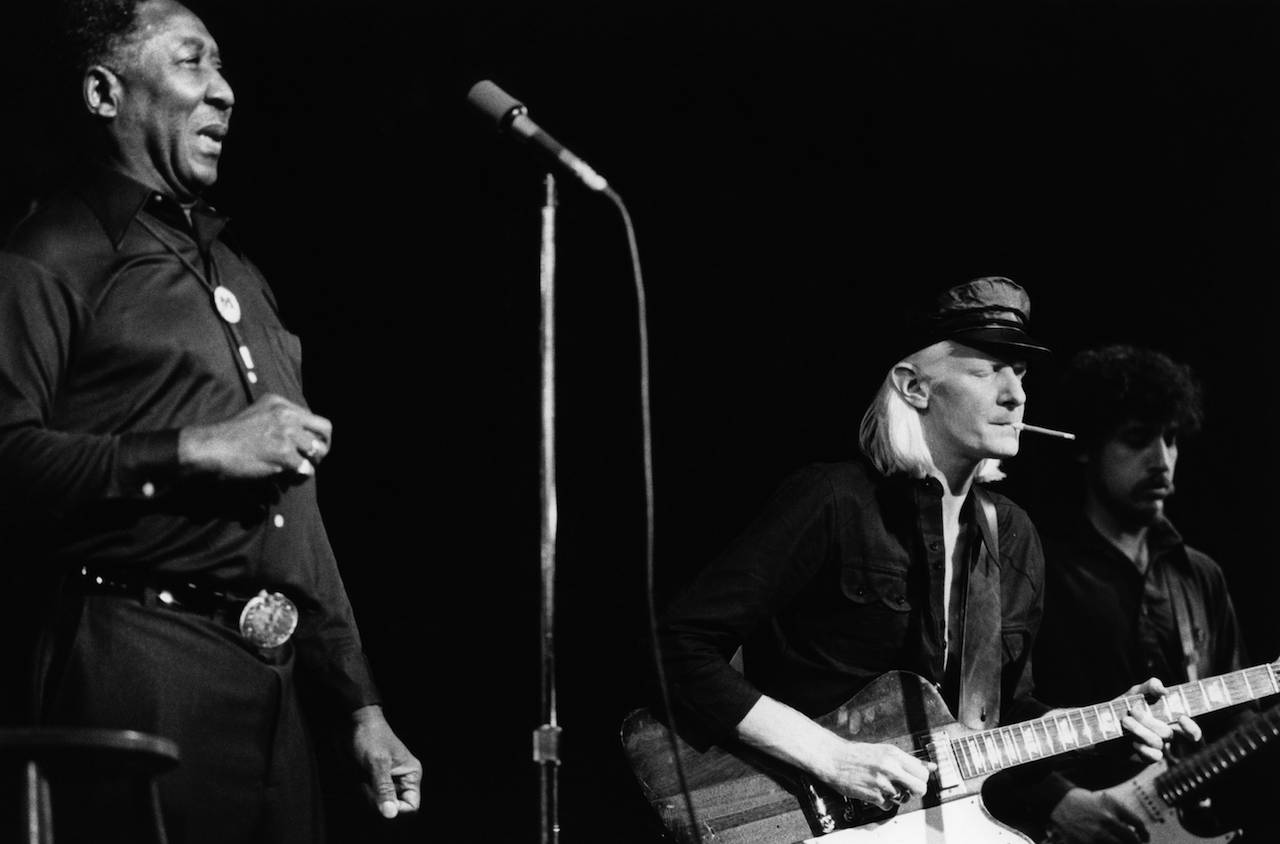
Along with its sequels – 1978’s I’m Ready and 1981’s King Bee – Hard Again provided a vital precedent and template for the kind of ‘lion in winter’ recordings that enabled the likes of John Lee Hooker and Johnny Cash to create fresh bodies of work in their final years; albums which, like Muddy’s before them, succeeded in summarising and extending their great themes, triumphantly writing fresh, final chapters to their epochal life stories.
By the 1970s, the blues economy was not in great shape. The blues may indeed have had a baby and called the baby rock’n’roll, but now the kid was all grown up and hardly ever bothered to phone home. The torrid romance between rock and blues triggered in the mid-60s by The Rolling Stones had cooled into a sullen separation.
Few bluesmen then had the support of major record companies. BB King and Bobby ‘Blue’ Bland were still signed to ABC Records, but ABC were in the process of cutting John Lee Hooker loose.
Albert King was still with Stax, a classic indie which, thanks to distribution deals, first with Atlantic and then Paramount, was always able to punch above its weight in the marketplace. Similarly, Freddie King enjoyed the patronage of Leon Russell’s Shelter label, which was backed by A&M. The light at the end of Buddy Guy & Junior Wells’ tunnel – an Atlantic album to be co-produced in Miami by Eric Clapton and Ahmet Ertegun – turned out to be an oncoming train. Ertegun spent most of his time outside the studio, shopping and socialising. Clapton, meanwhile, spent most of his time schlumpfed out in a stupor behind the desk. The resulting album, 1972’s Buddy Guy & Junior Wells Sing The Blues, bombed, and Buddy and Junior were turfed out into the wilderness.
Almost everybody else pretty much had to fend for themselves, and Muddy must’ve felt that Chess, with or without the titular dynasty, was the only game left in bluestown. His last few years’ worth of Chess albums had been okay — ranging from run-ofthe-mill to almost-quite-good, culminating in the impressive Muddy Waters In Woodstock, sympathetically co-produced by Band drummer Levon Helm — and had not only sold okay but reeled in a few Grammy awards.
Two straws broke this particular camel’s back: the first was when Muddy’s recently-acquired manager Scott Cameron discovered massive holes in the company’s already legendarily arbitrary accounting procedures, and the second when GRT offloaded Chess, lock stock and master tapes, to the New Jersey-based soul label All Platinum, who were more interested in acquiring the back catalogue than in cutting any new records with the remaining roster of artists. Good-God-a’mighty, Muddy was free at last. And when the Blue Sky deal was signed, it was stipulated in Muddy’s contract that Johnny Winter would produce, and play on, all his records.
What could possibly go wrong? Answer: absolutely nothing.
Not until much, much later.
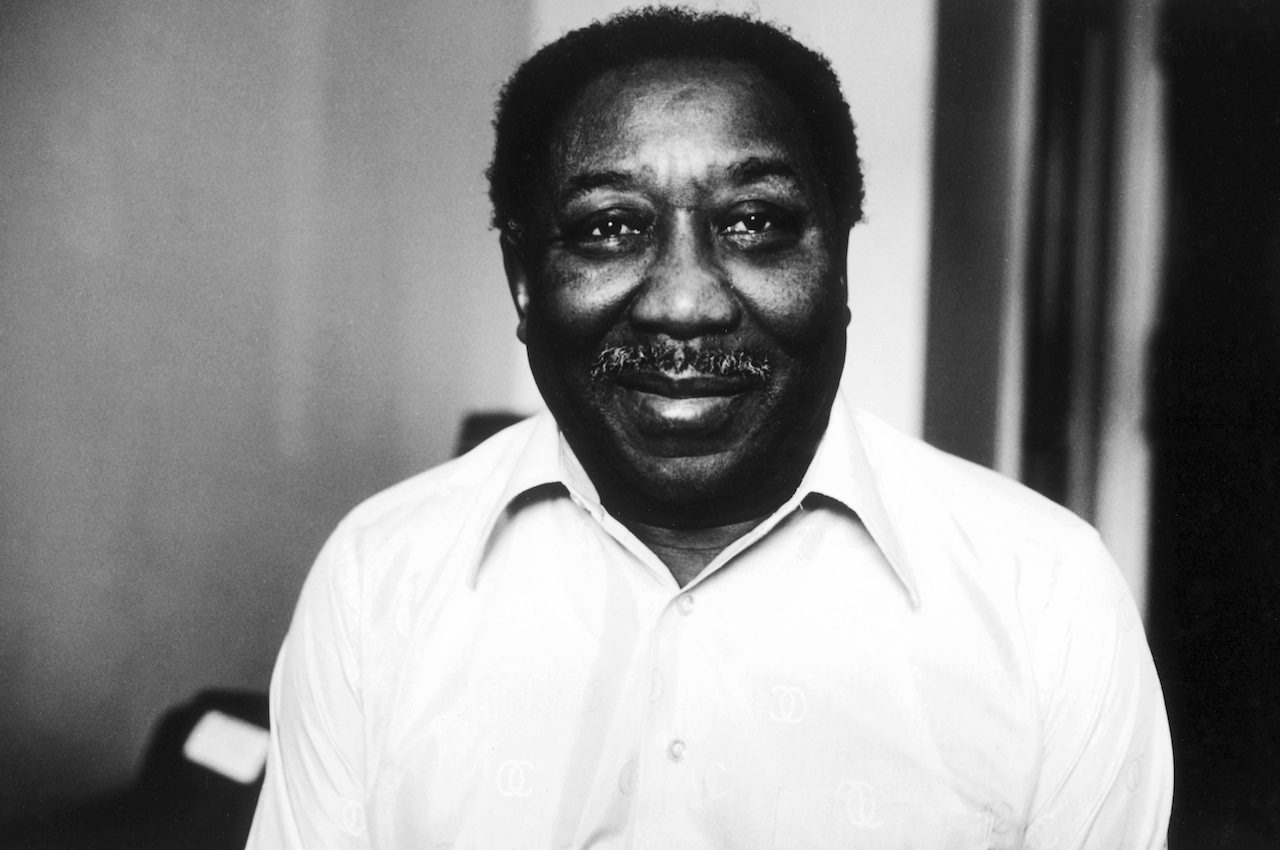
Work on what was to become Hard Again commenced in early October 1976. Winter, who’d happily put his rock’n’roll career on hold to devote the next nine months to working with Muddy, chose the studio – former Edgar Winter Group sideman Dan Hartman’s home facility, The Schoolhouse, in Westport, Connecticut – and invested considerable effort in giving engineer Dave Still a crash course in Muddy’s recorded history.
“I played him the good records and told him why they were good, and played him the bad ones and told him why they were bad,” remembers Winter. “What I really wanted to do as a producer was to make Muddy feel comfortable and make his music sound as good as it used to… The real raw blues and some early nasty rock’n’roll hadn’t been recorded right since recording techniques had gotten too good.
“We were all in one big room, there were almost no overdubs at all, practically everything was done at the same time, and there was a lot of room noise – instruments feeding through other instruments’ mikes. Everything that the normal studio engineer tries to make sure doesn’t happen, I tried to make sure that it did.”
(It’s a shame Winter wasn’t also producing another CBS/Epic signing, cutting their own debut a few thousand miles away. When The Clash arrived at CBS’s London studios, Joe Strummer dumped his amp right next to the drum kit, as per the band’s onstage positioning. When the engineer protested that this would mean they couldn’t achieve separation, Strummer glared at him and snarled, “I don’t know what separation is, but I don’t like it.”)
Muddy, of course, chose the musicians himself. From his own current road band came pianist Pinetop Perkins, drummer Willie ‘Big Eyes’ Smith and rhythm guitarist ‘Steady Rollin’ Bob Margolin.
To blow harp he recruited James Cotton, a veteran of pre-Elvis Sun Records who’d served on-and-off stints with Muddy, both live and in the studio, during the 50s and 60s, and was a formidable blues attraction in his own right. Cotton, in turn, brought along his own band’s bassist, Charles Calmese, a younger player who fitted in just fine once he’d been warned off trying to slip in any of that newfangled slap-and-pop Larry Graham stuff. And, naturally, Winter himself played lead guitar.
Along with his clean shirts and spare strings, Margolin had packed a selection of painstakingly assembled cassettes of Muddy standards drawn from his own record collection and, as each day’s session commenced around noon, the assembled company would listen to the tapes, discuss, jam and record until 5 or 6pm.
“We didn’t practise,” Muddy told Jas Obrecht. “We just got in there and we’d run over a song and put it down. We caught it.”
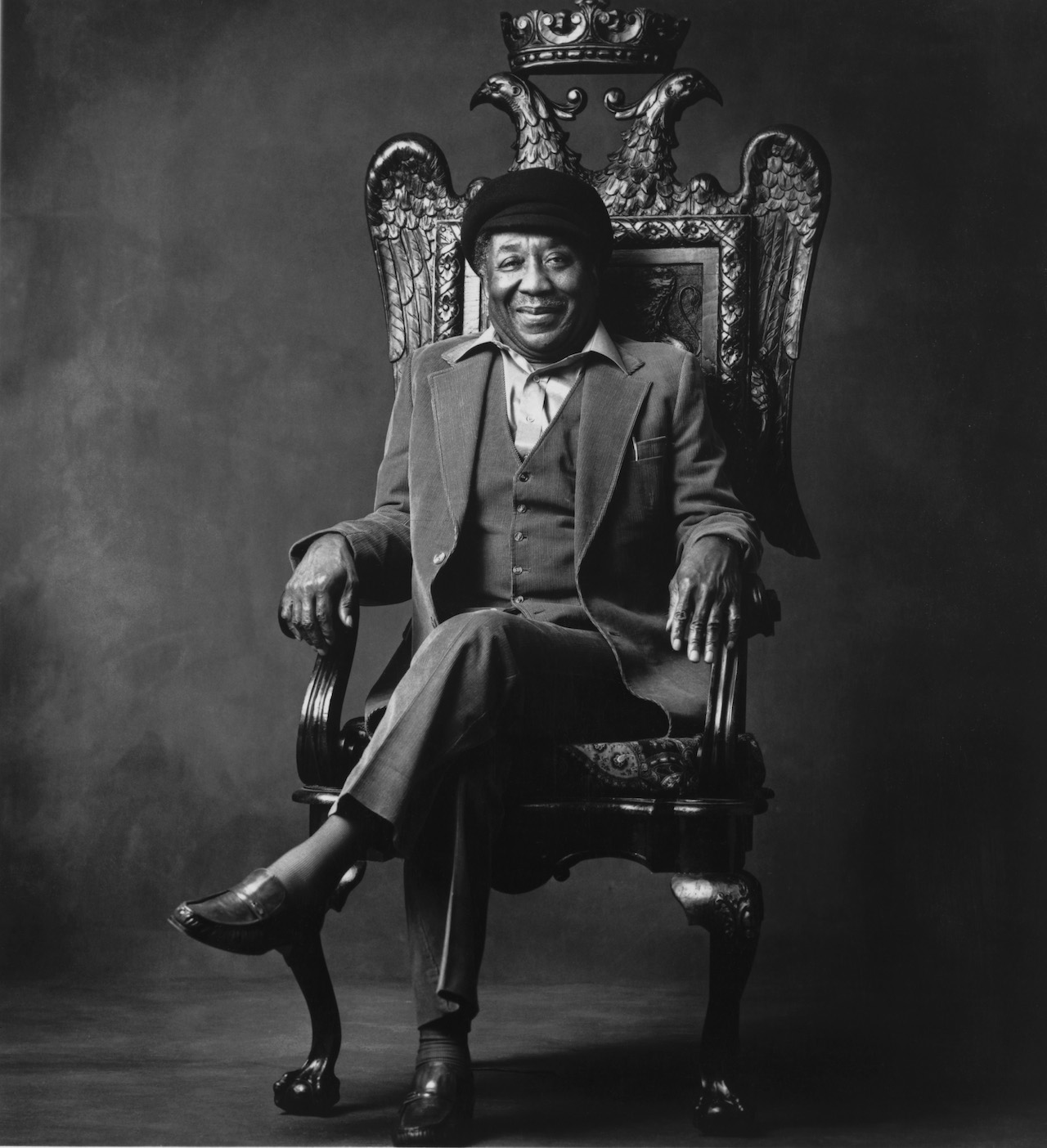
Indeed they did. Winter got everything he wanted from Muddy and his hand-picked crew, with one single exception: Muddy refused to play any guitar on the sessions. His rig was at his elbow and perfectly set up just the way he liked it: his treasured red Telecaster, ready tuned and heavy-strung with his preferred 12-56 string gauges, plugged into his even more treasured Fender Super Reverb amplifier (“A lot of the sound is the amp,” he said. “Even if I forgot my guitar and had to borrow one, I could make the sound come out of that amplifier”), with all the knobs set on 9 and no reverb. Winter had always wanted to blend his guitar with Muddy’s, but for that he would have to wait: all the guitars on Hard Again would be played by Winter and Margolin.
Nevertheless, Muddy received sleeve credit for guitar, as well as vocals. “I remember seeing reviews that said, ‘Muddy Waters’s slide playing sounds very exciting and vital,’” Margolin commented sardonically, “but it wasn’t Muddy playing.”
After a rousing revival of Muddy’s inaugural hit I Can’t Be Satisfied, with Winter recreating the maestro’s original guitar part on his National steel resonator, Muddy joyfully explodes, “You be pickin’ your ass off!” Indeed, he was.
Within less than a week, they had an album. And what an album: 45 minutes of joyfully rumbustious Chicago blues heaven.
Its secret weapon was Willie ‘Big Eyes’ Smith (“The greatest Saturday-night drummer alive,” according to Muddy), whose great big laid-back bump-and-grind WHOMP was shoved right to the front of Winter’s mix, yielding ground only to Muddy’s giant, refreshed vocals, and spurring the elderly titan on to sing with more passion and authority than he’d done on record since the landmark 1960 live album, At Newport. He was unmistakably back – and not only telling you so, but proving it. With Hard Again, the Godfather of Chicago Blues was reclaiming his turf.
And it grabbed you by the lapels right from the git-go. That version of Muddy’s 1955 hit Mannish Boy (his co-option of Bo Diddley’s I’m A Man, which had itself been a spin on Muddy’s own Hoochie Coochie Man) has become so familiar from its frequent inclusion in movies and commercials that it’s easy to take it for granted, but its impact in 1977 was immense. It simultaneously flattened the ’55 cut, the Bo original – and the listener.
Go ’head on, listen to it right now. If you don’t have the record, hit it up on YouTube or the streamer of your choice. Don’t worry. We’ll wait.
WHOOOOAAAAAAAH-YEAHHH… I said ohhh yeahhh…
Okay? Check out this mess. All that background hollering and shouting – by the band, led and egged on by Winter – wasn’t planned or rehearsed. They just did it because they couldn’t not do it. It felt that good. Muddy wasn’t going through the motions: he was in the moment at every moment, and the band were right there with him, nailing that one over-and-over riff down so hard you’d have an easier job picking up Thor’s hammer.
And speaking of Thor’s hammer, let’s hear it again for the magnificent Willie ‘Big Eyes’ Smith, laying down the groove with such unanswerable weight and authority that, when Muddy performed the song with The Band at their farewell concert that November (captured in Martin Scorsese’s The Last Waltz), even the great Levon Helm himself couldn’t match it.
- The 20 Greatest Chicago Blues Records
- "Remember me as a good blues player..." The real Johnny Winter.
- Buyer's Guide: Muddy Waters
- Hubert Sumlin: Howlin' Wolf's Right Hand Man
You might think nothing could follow that and you might even be right, but Muddy, Johnny and the crew give it a damn good go. The new songs Muddy brought to the party – Deep Down In Florida, Bus Driver, Crosseyed Cat, Jealous Hearted Man and Little Girl – may not have been in the front rank of his compositional catalogue, but for groove, vibe and the sheer infectious joy of music-making, they didn’arf sound good. Plus there was the rollicking The Blues Had A Baby (nicked from Brownie McGhee, but thoroughly Muddified) and the three back-catalogue classics: Mannish Boy, Can’t Be Satisfied and I Want To Be Loved.
The latter pair were both associated with The Rolling Stones, as a track from their second UK album and the B-side of their 1963 debut single Come On respectively. Winter might have been aware of this fact, but Muddy certainly wasn’t. He did, however, have plenty of time for the Stones. They may have owed him – but he owed them right back. Don’t take my word for it – ask Muddy. I did.
“They created a whole wide-open space for the music,” he said. “They said who did it first, and how they came by knowin’ it. They told the truth about it, and that really put a shot in my arm with the whites. I tip my hat to ’em. They took a lot of what I was doin’, but who care? The Rolling Stones… It took the people from England to hip my people – my own white people – to what they had in their own back yard. It may sound funny, but it’s the truth. That’s what it took to wake up the people in my own country, in my own state where I was born, that a black man’s music is not a crime to bring in the house. There was a time when a kid couldn’t bring that music into a father and mother’s house. ‘Don’t bring that nigger music in here!’ That’s right!”
A measure of Muddy’s latterly elevated status, he was eventually invited to perform for President Jimmy Carter in the White House. A man who’d grown up in a world where it was inconceivable for a black man to be welcomed into a white home (“Where I’m from, a black man couldn’t even get into a white man’s front room”) was now playing the White House as the honoured guest of the President – a President from Georgia, no less.
With Hard Again receiving hosannas and garlands from critics all over the blues-loving world and nosing into the lower reaches of the US album charts, Muddy, Winter and the rest of the crew took the show on the road. Despite the puzzlement of some of Winter’s fans, who couldn’t quite figure out why their hero was serving as an opening act and backing musician (let alone why he wasn’t wearing his satins and jewellery and playing Rock And Roll, Hoochie Koo), they hit the clubs and theatres, packed them out and practically burned them down. The album duly scored Muddy a Rolling Stone Critics’ Award, and also his fourth Grammy.
The format of the shows stayed pretty much the same throughout the tour: Winter would come out with the band and do an hour or so, then call a break, after which the band would return for a couple of instrumentals, before Winter rejoined them to play a few more songs and then, finally, bring Muddy out.
“I can’t do no hour and a half or two hours no more, man,” said Muddy of the shows. “I know the kids would love for me to stay out there more. I could go on for a few minutes longer but I’m trying to protect this one body. The kids be hollerin’ for more all night, but if I did, in a coupla weeks I be lyin’ on my back in a bed somewhere. I’m tryin’ to protect Muddy Waters. You don’t get a 62-year-old man [he was actually 64 at the time] out on no stage for no two hours, man… You kiddin’?”
(What, we wonder, would the great man have made of the spectacle of a damn-near-70-year-old Mick Jagger still doing exactly that in 2013?)
Winter’s former colleague Rick Derringer had this to say of the Waters/Winter pairing: “What I liked about Muddy and Johnny together wasn’t how good Johnny was playing, but just the fact that when Muddy was on the stage with Johnny, he was incredibly alive and aware and energetic… He just had to look over and see Johnny there. If he could see him, it was great. If you ask Muddy, ‘Which one of the young rock’n’roll guys turns you on?’ he’d say, ‘My favourite one is that Johnny Winter.’ And Johnny’d tell you that his all-time idol – living, at least – is Muddy Waters. So when they get together, it’s a real two-way thing. That’s why they work good.”
And Muddy was fiercely protective of Johnny Winter. If you even utter a mild criticism of his singing, Muddy would brusquely retort, “He got a good voice on him for a white boy! How the hell you expect him to be able to sing like me?”
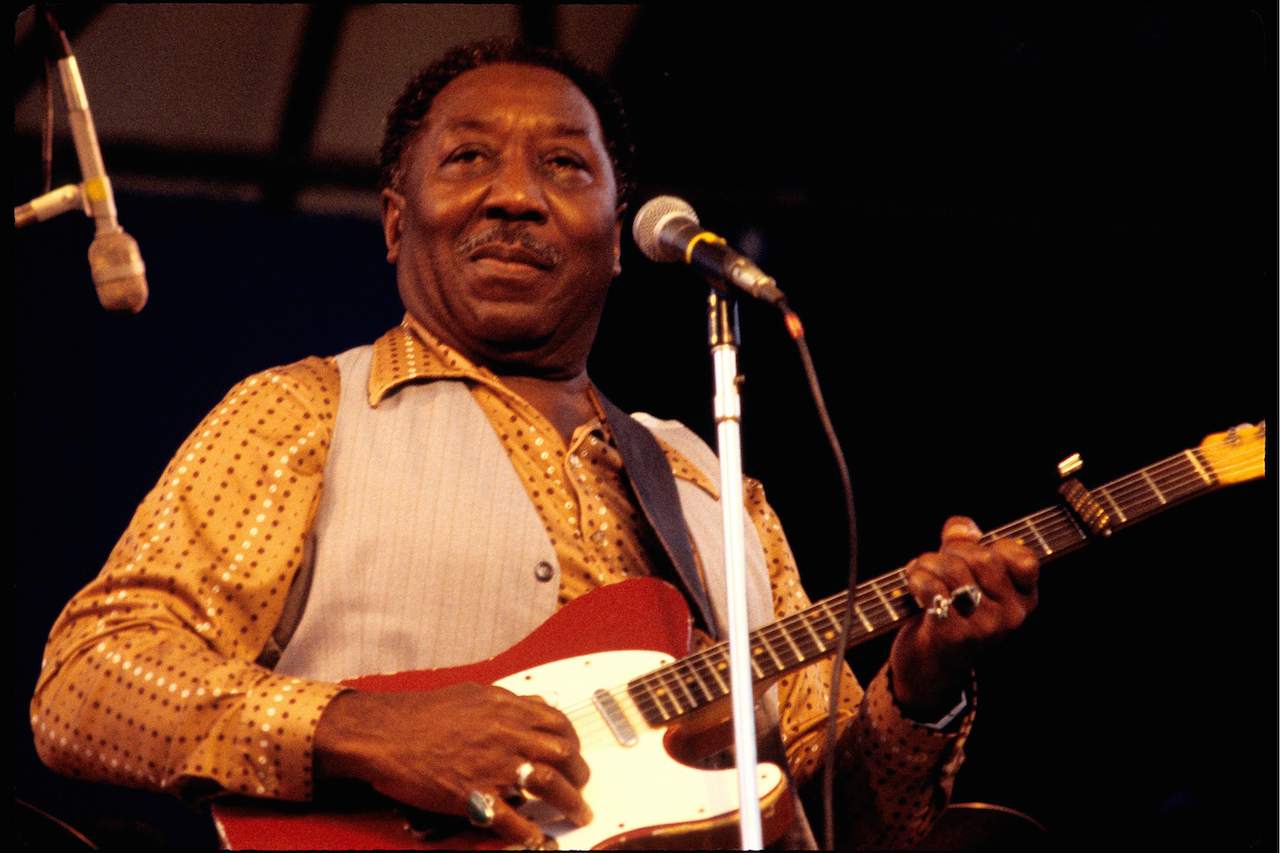
The Hard Again tour triumphantly concluded, Winter took the band straight back into The Schoolhouse to
record an album of his own, Nothin’ But The Blues. Even Muddy himself dropped by to sing a duet with Winter on his song Walkin’ Through The Park.
With Hard Again still fresh, Muddy was already speculating about a potential sequel. “We talked to Jimmy Rogers and he’s ready, and maybe on the next one we’ll use Walter Horton. He’s an old-timer, and he got some good old sound in his body.”
Sure enough, both were there the next time around, though veteran pianist Sunnyland Slim – who’d originally introduced Muddy to the Chess brothers back in the mid-1940s and whom Muddy had wanted to add to the gumbo – wasn’t. Rogers had been a mainstay of Muddy’s first great Chicago band, playing second guitar and cutting tracks of his own on Muddy’s studio time, until he had enough hits to strike out on his own.
Horton – variously known as ‘Big Walter’ (as opposed the other Little Walter), ‘Shakey’ and ‘Mumbles’ (the latter nickname was bestowed upon him in Memphis by Sun boss Sam Phillips; not surprisingly, Horton hated it) – was one of the great 50s Chicago harps. He’d replaced Junior Wells in Muddy’s band and played the classic harp licks on Rogers’ 1956 solo hit Walkin’ By Myself (you may also have seen him playing Boom Boom behind John Lee Hooker in the Maxwell Street scene in The Blues Brothers). He ended up trading off and duetting with Muddy’s road-band harp guy Jerry Portnoy, who was invited along this time, partly as insurance in case the notoriously cantankerous and unreliable Horton, who’d been less than co-operative when guesting on Winter’s major-label debut album, kicked up (which, due to his boundless respect for Muddy, ‘the old goat’ didn’t).
With his old spar Rogers on the team, Muddy was up for playing some guitar during recordings, which meant that there were a lot of guitarists at this session. Steady Rollin’ Bob Margolin therefore ended up playing bass: not his instrument of choice, but he knew Muddy’s music 65 ways from Sunday, played the groove from the inside and generally earned his nickname all over again.
Despite the personnel shifts, 1978’s I’m Ready was pretty much the same mixture as before: a few new songs, a few reworked Muddy standards, and a few songs by others added to the repertoire. Muddy played a little guitar this time around: when his slide guitar enters the mix on 33 Years, it’s clear that, cool as Winter-doing-Muddy was, nothing beat Muddy-doing-Muddy.
Once again, the album reaped a Rolling Stone Critics’ Award and a Grammy. And once again, after pausing only for a few European dates with Eric Clapton, the ensemble hit the road, this time without Winter, who had a career of his own to return to, and a hole in his bank balance to fill. Nevertheless, the experience of his stint with Muddy had changed him permanently.
“Working with Muddy made me realise that blues was what I wanted to do,” Winters reflected. “Rock’n’roll was okay, but blues was my first love. I might not make as much money as [I did as] a rock’n’roll player, but blues made me happier.”
Thus it was that Johnny eventually turned away from arena rock, recording for dedicated specialist labels like Alligator and PointBlank and reconsecrating himself to the blues.
There was a live album, drawn from both the Hard Again and I’m Ready tours, 1979’s Muddy ‘Mississippi’ Waters – Live, which secured Muddy another Grammy. However, the wheels were starting to come off.
In 1980, the team reassembled once again at The Schoolhouse to cut what would turn out to be Muddy’s final studio album, King Bee. This time, no distinguished alumni augmented the ensemble: just Muddy, his road band and Winter. And this time the atmosphere, previously so convivial and high-spirited, was positively poisonous.
Muddy was severely at odds with both his band and his management: the band because, while Muddy’s gig fees and record sales had skyrocketed, the musicians’ wages had stayed the same; and his management because, even though Scott Cameron had successfully wrested Muddy’s songwriting copyrights back from Chess’s publishing wing Arc Music, Muddy felt that Cameron’s one-third share of the revenues from their newly formed Watertoons company was too high. About the only person involved with whom he was still buddies was Winter.
Despite bringing in his last great original composition, Champagne And Reefer (‘Give me champagne when I’m thirsty/Give me reefer when I wanna get high’), Muddy was distracted and unenthusiastic, unwilling to go much beyond first takes. So few new masters were generated that, as producer, Winter was forced to pad the album with outtakes from previous sessions. And when the whole thing was finally done, the longest-serving band Muddy’d ever had quit on him en masse after harp dude Jerry Portnoy, whom Waters and Cameron considered a troublemaker, was fired. They went out on their own as The Legendary Band.
In 1982, Muddy was diagnosed with cancer. A few more dates with Eric Clapton followed a brief remission and rally, but the last fair deal had gone down. Muddy Waters died at home in 1983, mere weeks after his 70th birthday.
The records Muddy Waters made with Johnny Winter during the second half of the 1970s were never intended to displace or replace the classic Chess sides cut in Chicago between the late 40s and the early 60s, though they did provide Muddy and his family with a rather more reliable revenue stream. However, they can stand beside them with pride as their equal in both passion and power, and as a vital cornerstone of the musical monument Muddy Waters, the Godfather Of Chicago Blues, the Hoochie Coochie Man, left behind for us, and for the generations yet unborn.
Rock of ages? This is the blues of ages… and it will remain a continuing source of joy and inspiration for as long as any music even faintly resembling the blues survives.
Charles Shaar Murray is the award-winning author of Crosstown Traffic: Jimi Hendrix And Post-war Pop, and Boogie Man: The Adventures of John Lee Hooker in the American Twentieth Century. The first two decades of his journalism, criticism and vulgar abuse have been collected in Shots From The Hip. A founding contributor to Q and Mojo magazines, his work has appeared in newspapers like The Guardian, The Observer, The Independent, The Independent on Sunday, Evening Standard, and magazines including Word, Vogue, MacUser, Guitarist, Prospect and New Statesman.
